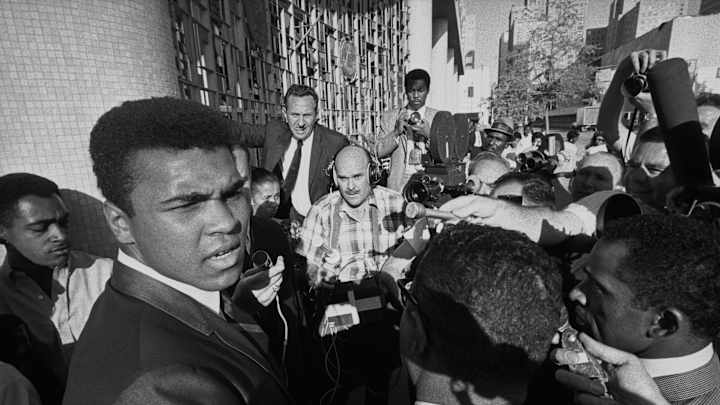This Day in Sports History: Muhammad Ali Refuses Induction into Army, Stripped of Title

Muhammad Ali's boxing career was put on pause when he refused to be inducted into the U.S. Army 53 years ago today.
On April 28, 1967, a 25-year-old Ali denied his call for military service while citing religious reasons. As punishment, Ali was convicted of draft evasion, stripped of his heavyweight title, suspended from boxing, sentenced to five years in prison and fined $10,000.
Widely considered among the greatest boxers of all time, Ali was called to join the armed forces while the United States was involved in the Vietnam War. The army lowered its classification for draftees in 1966, allowing Ali to qualify after he originally failed his test in 1964 due to his dyslexia.
“I ain’t got no quarrel with those Vietcong,” Ali said after he found his status changed.
During his scheduled U.S. Armed Forces induction in Houston, Texas on April 28, Ali refused to step forward three times as his name was called. After receiving a warning and being informed of the consequences, Ali did not acknowledge his name-call one final time. Later that day, Ali was stripped of his title and had his boxing license suspended, and he was found guilty of violating the Selective Services law on June 20, 1967.
Ali remained out of boxing for over three years until he was able to attain a license for a fight on October 26, 1970 against Jerry Quarry in Atlanta, where he recorded a knockout. Ali, who held a 56-5 record in his professional boxing career, later suffered his first loss on March 8, 1971 after a 15-round bout against Joe Frazier in the “Fight of the Century."
Though he was sentenced to five years in prison, Ali stayed out of jail before the Supreme Court was able to rule on his appeal. On June 28, 1971, Ali's case "Clay v. United States" was overturned by a unanimous 8-0 decision, allowing him to avoid jail time altogether.
While away from boxing, Ali became a popular speaker at colleges across the United States. One of Ali's most popular speeches, entitled "Black is Best," was spoken in front of 4,000 students and staff members at Howard University in 1968. He also became known for his free-style rhymes and poetry during his time in boxing.
As Ali brought awareness to the civil rights movement, he formed a lasting cultural impact in America. In 1970, Ali was given the annual Martin Luther King Award by civil rights leader Ralph Abernathy, who said Ali was "a living example of soul power, the March on Washington in two fists."
In his return to boxing, Ali became the only three-time heavyweight champion in the sport's history. Two of his most historic fights include the "Thrilla in Manila" with Frazier and "The Rumble in the Jungle" with George Foreman, the latter of which was viewed by 1 billion people worldwide.
In June 1979, Ali announced his retirement from professional boxing—but it did not last long. He returned in a fight on Oct. 2, 1980 against Larry Holmes to attempt to win the WBC heavyweight championship belt a fourth time. Ali fell by stoppage for the first time in his career, and a year later lost in 10 rounds to Trevor Berbick in his final fight.
Three years after his official retirement, Ali announced his Parkinson's diagnosis at 42 years of age. He still remained active in the community through his philanthropic and humanitarian efforts.
"The Greatest" died on June 3, 2016 in Phoenix, Ariz., at the age of 74 after being hospitalized with a respiratory issue.
Throughout his life and career, Ali graced the cover of Sports Illustrated 40 times—a total only topped by Michael Jordan.
